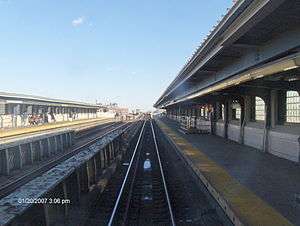40th Street–Lowery Street (IRT Flushing Line)
| 40th Street–Lowery Street | |||||||
|---|---|---|---|---|---|---|---|
| New York City Subway rapid transit station | |||||||
 | |||||||
| Station statistics | |||||||
| Address |
40th Street & Queens Boulevard Queens, NY 11104 | ||||||
| Borough | Queens | ||||||
| Locale | Sunnyside | ||||||
| Coordinates | 40°44′37.72″N 73°55′27.04″W / 40.7438111°N 73.9241778°WCoordinates: 40°44′37.72″N 73°55′27.04″W / 40.7438111°N 73.9241778°W | ||||||
| Division | A (IRT) | ||||||
| Line | IRT Flushing Line | ||||||
| Services |
7 | ||||||
| Transit connections |
| ||||||
| Structure | Elevated | ||||||
| Platforms | 2 side platforms | ||||||
| Tracks | 3 | ||||||
| Other information | |||||||
| Opened | April 21, 1917 | ||||||
| Former/other names | Lowery Street | ||||||
| Traffic | |||||||
| Passengers (2015) |
3,421,569[1] | ||||||
| Rank | 149 out of 422 | ||||||
| Station succession | |||||||
| Next north |
46th Street–Bliss Street: 7 | ||||||
| Next south |
33rd Street–Rawson Street: 7 | ||||||
| |||||||
| |||||||
40th Street–Lowery Street is a local station on the IRT Flushing Line of the New York City Subway. It is served by the 7 local train at all times.
History
The Flushing Line was opened from Queensboro Plaza to 103rd Street – Corona Plaza on April 21, 1917, with a local station at 40h Street.[2]
The platforms at 40th Street were extended in 1955–1956 to accommodate 11-car trains.[3]
Station layout
| P Platform level | ||
| Side platform, doors will open on the right | ||
| Southbound local | ← | |
| Peak-direction express | ← | |
| Northbound local | → | |
| Side platform, doors will open on the right | ||
| M | Mezzanine | to entrances/exits, station agent, MetroCard vending machines |
| G | Street Level | Entrances/Exits |
The station has two side platforms and three tracks. The center track is used by peak-direction <7> express trains during rush hours. It has one center exit/entrance with dual fare control and therefore, no free transfer directions, although the station's layout could allow one.
In 1998, the name "Lowery", a former name for 40th Street in 1917 at the time of construction,[4] was removed from the station and maps, but was restored in 2004 as part of a historical move. The 1999 artwork featured at the station is called Q is for Queens by Yumi Heo.
References
- ↑ "Facts and Figures: Annual Subway Ridership". Metropolitan Transportation Authority. Retrieved 2016-04-19.
- ↑ "Transit Service on Corona Extension of Dual Subway System Opened to the Public". The New York Times. April 22, 1917. p. RE1. Retrieved 2011-10-02.
- ↑ Authority, New York City Transit (1955-01-01). Minutes and Proceedings.
- ↑ "QUEENS BOULEVARD along the Flushing El". Forgotten NY. Retrieved 2012-12-28.
External links
-
 Media related to 40th Street – Lowery Street (IRT Flushing Line) at Wikimedia Commons
Media related to 40th Street – Lowery Street (IRT Flushing Line) at Wikimedia Commons - nycsubway.org – IRT Flushing Line: 40th Street/Lowery Street
- Station Reporter — 7 Train
- The Subway Nut — 40th Street–Lowery Street Pictures
- MTA's Arts For Transit — 40th Street–Lowery Street (IRT Flushing Line)
- 40th Street entrance from Google Maps Street View
- Platforms from Google Maps Street View



